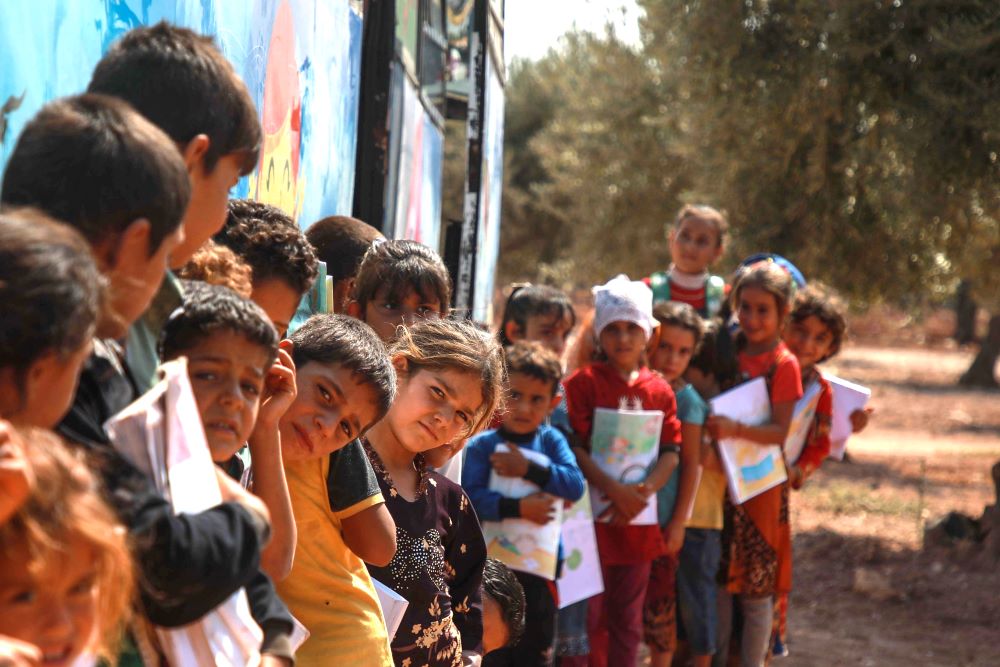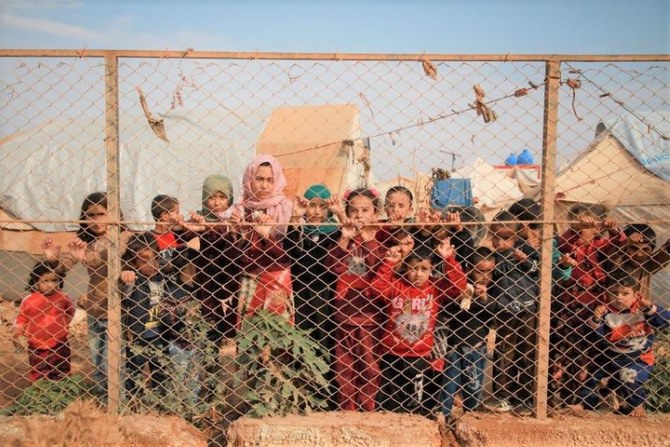LONDON: During the final days of Daesh’s “caliphate” earlier this year, some 25 British women and 60 of their children found themselves stranded — without consular support — after fleeing the terror group’s territories.
Most of the children are under the age of 5, making it almost certain that they were born in Daesh-occupied lands.
According to reports on the ground, they are facing unimaginable horror. “Many have injuries or disabilities from the fighting. At least 300 children have already died,” said George Graham, Save the Children’s lead on protecting children in conflict.
“One 15-year-old girl arrived at the camps with shrapnel embedded in her stomach. She was in so much pain while waiting for treatment that she resorted to cutting it out herself using a rusty razorblade that she found on the floor,” he added.
“Another girl, who was 14 when she was taken to Syria, told us that under Daesh she was raped, forced to marry and saw her father beheaded. A 15-year-old boy told us he was imprisoned and given lashes.”
A report from the International Crisis Group (ICG) in the Roj and Al-Hawl refugee camps in northeastern Syria detailed a litany of suffering.
Al-Hawl lacks any safe spaces or play areas for children. There is no proper education in either camp.
Paediatricians and psychologists at Al-Hawl noted a significant decline in children’s well-being in just six months.
The ICG notes that many children suffer from severe malnutrition and acute diarrhoea, with tuberculosis, measles and hepatitis also widely reported.
The suffering of these children, caught up in a whirlwind of terror and violence created by adults, has led to worldwide calls for Western nations to improve their humanitarian efforts and recover children in desperation.
But the UK has been reluctant to take responsibility for its citizens in Syria. In February, then-Home Secretary Sajid Javid announced the UK government’s intention to strip citizenship from Daesh wife Shamima Begum.
British-born Begum, who has Bangladeshi heritage, was warned by Dhaka’s Foreign Minister Abdul Momen that she would face the death penalty in the country as it has a “zero tolerance policy” toward terrorism.
Without citizenship allowing her to return to the UK, and with the threat of hanging in Bangladesh, Begum has been left stranded in a warzone.

It’s an atrocious predicament for a child to be in, and will likely affect them across multiple domains of their life. — Helena Lewis, Psychotherapist
The UK’s approach has led many to accuse the government of abandoning its responsibilities, washing its hands of the issue and transferring the problem to Middle East governments.
Baghdad is especially frustrated as Iraqis have been expected to take the brunt of the jailing and punishment of Daesh fighters.
Turkey has threatened the UK over its inaction by sending extremists back to Britain.
On Nov. 14, a 26-year-old man was arrested at Heathrow Airport after being sent back by Turkey.
Ankara said he was among eight Daesh suspects it had deported as part of its plans to repatriate foreign terrorists held in Turkish prisons.
But as Western countries face criticism for their policies toward returning fighters, the spotlight has shifted to the caliphate’s children, whose lives hang in the balance.
For the orphans of hate, some hope remains. Last month, the UK’s Foreign Secretary Dominic Raab announced that the government would repatriate three orphaned children of British Daesh members from Syria.
The children, who have not been identified due to security reasons, are set to be the first Britons recovered from lands previously occupied by Daesh.
In a statement on Nov. 21, Raab said bringing children back from the clutches of the terror group is the “right thing to do.”
He added: “These innocent, orphaned children should never have been subjected to the horrors of war. Now they must be allowed the privacy and given the support to return to a normal life.”
But after an early upbringing in the hands of terrorists, and after losing their parents to a conflict they had no choice but to enter, what possibility of a “normal” life remains unclear.

Displaced Syrian children queue outside a bus converted into a classroom in the village of Hazano in northwestern Syria. (AFP)
London-based psychotherapist Helena Lewis told Arab News that their support needs will be “high, complex and long term.”
She said: “It’s an atrocious predicament for a child to be in, and will likely affect them across multiple domains of their life: Health, education, employment and relationships.”
She added: “After separation from family, they may be experiencing loss, fear and unmanageable emotional turmoil.”
According to Lewis, care for children recovered from conflict zones “needs to be flexible and ongoing,” and could include “access to their communities of origin and social care support.”
Further repatriations for the remaining children, who are not thought to be orphaned, remain uncertain.
Priti Patel, the UK’s new home secretary, blocked recovery operations for orphans and unaccompanied minors in October. The Guardian newspaper quoted sources as saying she was backed by Defence Secretary Ben Wallace.
But critics of the government’s tough approach point to the UN Convention on the Rights of the Child, which Britain ratified in 1991.
Articles 38 and 39 of the guidelines state that “children who have experienced … torture or who are victims of war must receive special support to help them recover. Governments must do everything they can to protect and care for children affected by war.”
Many children of Daesh’s terror are already receiving special support from other Western nations.
France, Germany, Norway and Denmark have recovered some children from the warzone.
Canberra also recently repatriated eight children and grandchildren of Australian Daesh fighters.
In light of this multinational response, charities and crisis groups expect the British government to do more.
Save the Children said: “There are still as many as 60 British children … stranded in appalling conditions, and Syria’s harsh winter will soon begin to bite.”
The charity added: “Our very real fear is that they won’t all survive to see the spring. They must all be brought home before it is too late.”
The road ahead for these children and the UK government will be challenging. As winter approaches and the Syrian crisis continues, pressure is mounting on ministers to act as young lives hang in the balance in the most precarious conditions.
















